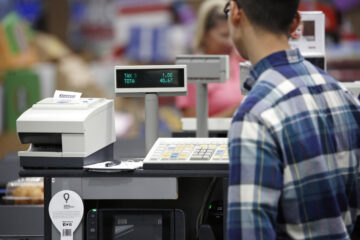Back in 2015 Chipotle had an E. Coli scandal that literally threatened to put the company out of business.
In a single year, the company’s stock dropped by 37% of its market value and the company’s profits plumetted.
Related: McDonald’s menu adds new value combo
“The fourth quarter of 2015 was the most challenging period in Chipotle’s history,” Chipotle CEO Steve Ells said in a statement at the time.
So, you would have to assume that the Mexican chain had a widespread outbreak that impacted hundreds, maybe even thousands of stores, and that it handled that outbreak poorly. In reality, that was not the case.
The Chipotle case involved 1,100 people getting sick over a three-year period between 2015 and 2018.
When the various stores (about 60) had reported incidents of people being sick, they were closed for half a day immediately for a deep cleaning. Once it was clear the issue was not isolated, the company shut down the entire chain in order to conduct more training and enact new procedures.
💰💸 Don’t miss the move: SIGN UP for TheStreet’s FREE Daily newsletter 💰💸
Chipotle clearly took the issue seriously when it could have clearly argued that if you cook fresh food, sometimes people might get sick. The company owned the issue and took responsibility but still saw the incidents drag on its business for years.
Now, another restaurant chain has reported some massive health and safety issues and has taken a bold step to address them.
A food safety scandal nearly brought Chipotle down.
Joe Raedle/Getty Images
Japanese chain closes nearly all locations.
Many restaurants in Japan specialize in a single dish. They may literally just serve that dish, or they sell it in many variants. Gyudon is a very simple beef and onion dish served over rice after being simmered in a savory/sweet sauce that’s often topped with an over easy egg.
It’s a Japanese staple that’s served in the United States but has not crossed over like ramen noodle bowls or teriyaki dishes.
Sukiya is Japan’s leading Gyudon restaurant chain with approximately 2,000 outlets nationwide, according to the restaurant chain’s website.
“At Sukiya, we offer a wide selection of delicious and affordable dishes in various sizes. Enjoy our combo menus featuring miso soup and salad, along with a diverse range of rice bowls and side dishes. We are sure to satisfy your cravings,” it shared,
The chain has closed nearly all of its roughly 2,00 locations after customers complained of rat and bug parts in their meals. Sukiay’s closures will last from March 31 through April 4.
More Retail News:
Iconic U.S. grocery chain debuts first UK store after a decadeTarget makes bold move to answer Walmart, AmazonForget McDonald’s, Walmart adds a new restaurant partner
It has never had to close so many locations at once.
“The move comes after a customer complained on Friday of finding part of a cockroach in a take-out item bought in Tokyo. That followed another incident in January when a bowl of miso soup served at an outlet in Tottori Prefecture had a rat in it,” NHK reported.
Sukiya plans to use the closure period to implement new cleaning protocols. It also plans to add new pest control measures.
McDonald’s also faced recent food contamination
Food contamination stories seem to impact companies in different ways. Chipotle was greatly harmed by its E. coli scandal because its marketing had been built around its fresh found and higher quality.
It remains to be seen how Sukiya is impacted, as it’s in the early days of its scandal.
McDonald’s (MCD) , however, recently went through its own E. Coli issues related to slivered onions in what CEO Chris Kempczinski called “a handful of U.S. states.”
He addressed the issue during the chain’s third-quarter earnings call.
“While the situation appears to be contained and though it didn’t affect Q3 numbers, it’s certainly an important development which I know is on many of your minds. For over 70 years, McDonald’s commitment to food safety has been uncompromising. Nothing is more important to us than the safety of our customers, and we’ve been proud of our industry leadership in this area,” he shared.
Consumers have traditionally been more forgiving of traditional fast-food chains when these incidents occur. He explained how this one was handled.
Related: Chipotle responds to bankruptcy, store closure reports
After the CDC first informed us of the investigation, we were able to quickly link the cases identified to slivered onions from one facility at our Taylor Farm supplier.
We swiftly removed them from our supply chain. We understand from health authorities that slivered onions from Taylor Farm’s Colorado Springs facility are the likely source of contamination. McDonald’s has stopped sourcing onions from this facility indefinitely. Importantly, the Colorado Department of Agriculture confirmed on Sunday that they did not detect E. coli in the samples of beef patties from our restaurants and have no further plans to test.
It was a swift response and Kempczinski made an effort to show that these incidents are very rare.
“The last serious public health issue in the U.S. associated with McDonald’s occurred more than 40 years ago. The recent spate of E. coli cases is deeply concerning, and hearing the reports of how this has impacted our customers has been wrenching for us,” he added.


